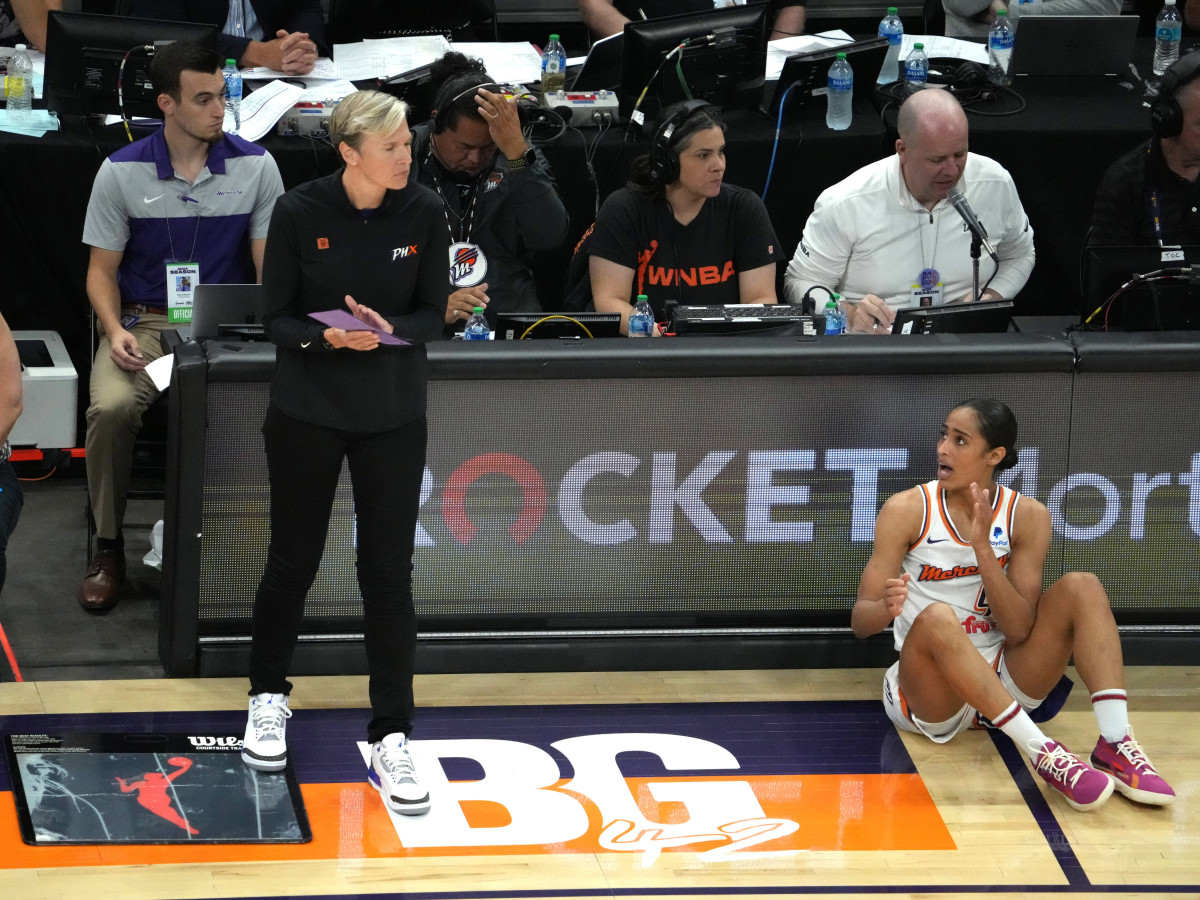Everything We Know About Brittney Griner’s Ongoing Detention in Russia
Mercury center Brittney Griner was sentenced to nine years in Russian prison on Aug. 4 on a charge of bringing hashish oil into Russia. She was also fined 1 million rubles, or about $16,300.
President Joe Biden emphasized that the detainment is “wrongful” and said in a statement: “It’s unacceptable, and I call on Russia to release her immediately so she can be with her wife, loved ones, friends, and teammates. My administration will continue to work tirelessly and pursue every possible avenue to bring Brittney and Paul Whelan home safely as soon as possible.”
The Mercury put out a statement supporting Griner, reading, in part: “We remain heartbroken for her, as we have every day for nearly six months. We remain grateful to and confident in the public servants working every day to return her to her family and us. We remain faithful the Administration will do what it takes to end her wrongful detention.”
The WNBA and NBA also weighed in.
“Today’s verdict and sentencing is unjustified and unfortunate, but not unexpected and Brittney Griner remains wrongly detained,” Commissioners Cathy Engelbert and Adam Silver said in a joint statement. “The WNBA and NBA’s commitment to her safe return has not wavered and it is our hope that we are near the end of this process of finally bringing BG home to the United States.”
Almost three weeks after Griner pleaded guilty to bringing hashish oil into Russia, the U.S. government revealed it has made a prisoner exchange offer to Russia for the WNBA star and another American, according to CNN.
Griner has been detained since Feb. 17 after being arrested at an airport outside of Moscow.
CNN reported that American Paul Whelan, who has been held since 2018 over espionage allegations, and Viktor Bout, who is a convicted Russian arms dealer, are part of the possible exchange deal. President Joe Biden reportedly supports the swap of Griner and Bout for Whelan, overriding any possible opposition from the Department of Justice.
On July 7 in the second hearing of her trial, Griner pleaded guilty to charges, having told the judge, “I’d like to plead guilty, your honor. But there was no intent. I didn’t want to break the law.” The move came just days after Griner wrote a letter to Biden, excerpts of which Quinn published on Twitter.
“As I sit here in a Russian prison, alone with my thoughts and without the protection of my wife, family, friends, Olympic jersey, or any accomplishments, I’m terrified I might be here forever,” Griner wrote.
A Russian court ordered Griner to remain in custody for the duration of her trial, and her detention was extended to Dec. 20, the Associated Press reported. Griner’s agent, Lindsay Kagawa Colas of Wasserman, tweeted after the extension, “The fact remains that the U.S. Government has determined that Brittney Griner is wrongfully detained and being used as a political pawn.”
Here is what we know about Griner’s detention:

Why was she detained, and what has happened since?
On Feb. 17, Griner was taken into custody at Sheremetyevo International Airport near Moscow, where Russian officials said they discovered vape cartridges containing hashish oil in her luggage. According to the Russian Federal Customs Service statement, a criminal case involving Griner was “opened into the large-scale transportation of drugs,” which can carry a jail sentence of up to 10 years in Russia.
News of Griner’s arrest was not made public until March 5, however, when the Customs Service said it had detained a U.S. basketball star. It also released a video that appeared to show Griner’s carry-on luggage being searched.
In between Griner’s arrest and news of her detention being made public, Russia invaded Ukraine, beginning an ongoing war that, according to Reuters, has killed at least 47,000 people and has seen at least 15 million people become displaced.
In an April op-ed for the Los Angeles Times, Colas wrote Griner was traveling back to Ekaterinburg from the U.S., connecting in Moscow, when she was detained. She had been participating in her seventh season with the prominent women’s basketball team UMMC Ekaterinburg, where players can earn six, or even seven, figures per season. Roughly half of the WNBA’s players were active overseas in 2022 to supplement their salaries from the U.S. league.
A WNBA spokesperson said in early March that all other league players who had been competing for either Ukrainian or Russian clubs during the offseason had left both countries. Many of the WNBA’s biggest stars, including two-time league MVP Breanna Stewart and last year’s MVP, Jonquel Jones, recently played with Griner on Ekaterinburg.
The U.S. has classified Griner as being “wrongfully detained.” What does that mean?
In the weeks following her arrest, Griner’s camp appeared to be concerned that significant publicity around the situation could make it worse. In an email to The New York Times, Colas said that since April 29, the U.S. government has classified Griner’s arrest as a “wrongful detainment,” a designation that allows the United States’ Office of the Special Presidential Envoy for Hostage Affairs more flexibility in efforts to negotiate her release, no matter how the Russian legal proceedings are playing out. The designation change (which was made public May 3) also signaled a strategy change in how those around Griner raised awareness of the situation.
“Griner’s reclassification as wrongfully detained by the U.S. government cued our shift to the more public activist elements of our strategy,” Colas told the Times.
Then White House press secretary Jen Psaki said the decision to classify Griner as wrongfully detained was made “in coordination with the hostage negotiator [SPEHA’s Roger Carstens] and the State Department.” ESPN reported that former U.S. ambassador to the United Nations Bill Richardson, who has past experience working as a private international hostage negotiator, has agreed to work on Griner’s case. In a late-May episode of HBO’s Real Sports With Bryant Gumbel, Richardson said he was “optimistic” about Griner’s return to U.S. soil, but that it would require some sort of exchange given her celebrity status.
Days before Griner was publicly labeled by the U.S. government as wrongfully detained, the Biden Administration announced the release of Trevor Reed, a former Marine who had been in Russian custody since 2019. Reed, who in July '20 had been sentenced to nine years in Russian prison for endangering the “life and health” of Russian police officers in an altercation (charges he denies), was part of a prisoner swap. His release has renewed public optimism that Griner could also be part of a swap.

What happened in the Griner trial?
Griner’s lawyer, Aleksandr Boikov, said before the trial that he expected it to take up to two months, according to The New York Times. A U.S. official told CNN the U.S. embassy in Moscow would send a diplomat to the first hearing. Several officials and experts familiar with Griner’s case told ESPN a trial and forthcoming conviction have always been likely developments, with sources telling ESPN that regardless of whether the Russian prosecutors present compelling or entirely fabricated evidence, the country has indicated it is willing to negotiate Griner’s release.
“The Russians have to keep pretending that this is a legitimate arrest,” Danielle Gilbert, assistant professor of military and strategic studies at the United States Air Force Academy, told ESPN. “There is no reason to believe that the charges are legitimate or that her trial will be fair. But if and when she’s convicted, the Russians will have made clear their credible alternative to a deal to bring her home.”
In the second hearing of her trial, Griner told the court that she packed the vape cartridges accidentally and had no intent of breaking Russian law. According to ESPN, the guilty plea is a strategy to help facilitate a prisoner swap.
Griner testified in court on July 27 and according to the Associated Press, “a language interpreter provided during her questioning translated only a fraction of what was said and officials instructed her to sign documents without providing an explanation.”
Griner maintained that she did not know how the cannabis oil, which she does have a doctor’s recommendation for, ended up in her luggage; however, she explained how she quickly packed “while under great stress,” per the AP. She stated she was not offered access to lawyers or informed of her rights.
The manager of UMMC Ekaterinburg, Griner’s team in Russia, testified on her behalf on July 14, as did one of Griner’s teammates. “Our task today was to tell the court about her characteristics as an athlete, as a person—tell about how she played a big role in the success of the Ekaterinburg club and Russian women’s basketball as a whole,” club director Maxim Rybakov told reporters outside the courthouse, according to the AP.
U.S. Representative Colin Allred, a Democrat from Texas, told The Washington Post that Griner is “for intents and purposes a political prisoner,” adding that those in the public should be prepared for a “sham” trial, resulting in a guilty verdict and sentence. ESPN noted that the trial will not have a jury. Per the AP, less than 1% of defendants in Russian criminal cases are acquitted, and, unlike in the U.S., acquittals can be overturned.
Secretary of State Antony Blinken said he is going to speak with Russian foreign minister Sergey Lavrov and demand Griner and Whelan’s release, he said in a briefing on July 27. Blinken added that they “put a substantial proposal on the table weeks ago” to help with the release, which is the first public acknowledgment of the proposal. According to the AP, if the call takes place, it will be the first between Blinken and Lavrov since a week before Russia invaded Ukraine in February.
Whelan, a former U.S. Marine, is being held in a Russian prison after he was convicted in June 2020 and sentenced to 16 years on suspicion of spying. Bout is a Russian national who was sentenced to 25 years by a U.S. judge for conspiracy to kill U.S. citizens, delivery of anti-aircraft missiles and providing aid to a Colombian terrorist organization.
How long could she be in Russia?
After pleading guilty to possession of the hashish oil, Griner faces nine years in Russian prison.
Speaking at a June rally in Houston in support of Griner, Reed, the recently released former Marine, described the conditions of Russian prisons as completely inhospitable, saying he received rotten food and a lack of medical care. He additionally called the country’s legal system “medieval.”
“Every day that you’re in prison there, it's like you’re waking up to a nightmare,” Reed said.
The AP also reported that Griner has been able to receive emails and letters from WNBA players during her detainment. The emails, per the AP, are printed out and delivered sporadically in bunches to Griner by her lawyer after they are vetted by Russian officials. While Griner doesn’t have access to the incoming email account, she either writes a response on paper and her lawyers take a picture of it or she dictates a reply.
Reed spent 985 days in Russian custody. Whelan has spent more than 1,000 days in Russian custody.
“Our position for some time on this has been very clear: Brittney Griner should not be detained. She should not be detained for a single day longer," State Department spokesperson Ned Price said in mid-June.

What are people saying about Griner’s detainment?
Griner’s letter to Biden was sent on Independence Day, and according to the excerpts from ESPN, she used that connection in asking for help from the White House, noting that her father is a Vietnam War veteran. “It hurts thinking about how I usually celebrate this day, because freedom means something completely different to me this year,” Griner wrote.
She went on to say: “I miss my wife! I miss my family! I miss my teammates! It kills me to know they are suffering so much right now. I am grateful for whatever you can do at this moment to get me home.”
On July 6, Cherelle Griner, Brittney’s wife, said she had spoken with President Biden and Vice President Kamala Harris. A White House statement said Biden reassured Cherelle that he was working to release Brittney from Russia.
“I am grateful to the both of them for the time they spent with me and for the commitment they expressed to getting BG home,” Cherelle said in a statement through ESPN. “While I will remain concerned and outspoken until she is back home, I am hopeful in knowing that the President read my wife’s letter and took the time to respond. I know BG will be able to find comfort in knowing she has not been forgotten.”
A senior administration official told CNN on July 27 that it had made the offer for Griner and Whelan for Bout “weeks ago.” They later added that it’s up to Russia “to be responsive to it, yet at the same time that does not leave us passive, as we continue to communicate the offer at very senior levels.”
Elizabeth Rood, U.S. chargé d’affaires in Moscow, was in court for the trial and had been checking in with Griner, who Rood said “is doing as well as can be expected in these difficult circumstances.”
Throughout the WNBA season, Griner’s teammates and coaches have continued to raise awareness of her situation. The Mercury met with the State Department in Washington, D.C., on June 13, ahead of their game with the Mystics. That meeting was followed by a meeting with U.S. Representatives Greg Stanton, a Democrat from Arizona (a longtime Mercury fan), and Sheila Jackson Lee, a Democrat from Griner’s hometown of Houston.
“It was great to hear from the State Department that we should continue to amplify that message and that we should continue to press all those who have any influence or power to help bring BG home,” Mercury coach Vanessa Nygaard told reporters afterward. “She’s our teammate, she’s an American and we want her back home.”
Players around both the WNBA and NBA have worn T-shirts and sweatshirts raising awareness for Griner’s detainment, with a Change.org petition seeking her “swift and safe return” having amassed more than 345,000 public signatures as of July 27.
The WNBA has also placed a floor decal on the home court of all 12 teams to keep Griner “top of mind” and recently announced Griner as an honorary All-Star starter.
“It is not difficult to imagine that if BG were here with us this season, she would once again be selected and would, no doubt, show off her incredible talents,” commissioner Cathy Engelbert said in the release announcing the honor. “So, it is only fitting that she be named as an honorary starter today and we continue to work on her safe return to the U.S.”
The WNBPA continues to tweet daily about Griner’s status.
Dear @brittneygriner,
— WNBPA (@TheWNBPA) July 27, 2022
It’s 7:30AM in Moscow. We want you to know, now more than ever, that we admire your strength and your courage.
All of us are behind you and we will not stop advocating for you until you are home.
Love you and miss you.#WeAreBG#WeAreNotThe144WithoutBG
More WNBA Coverage:
